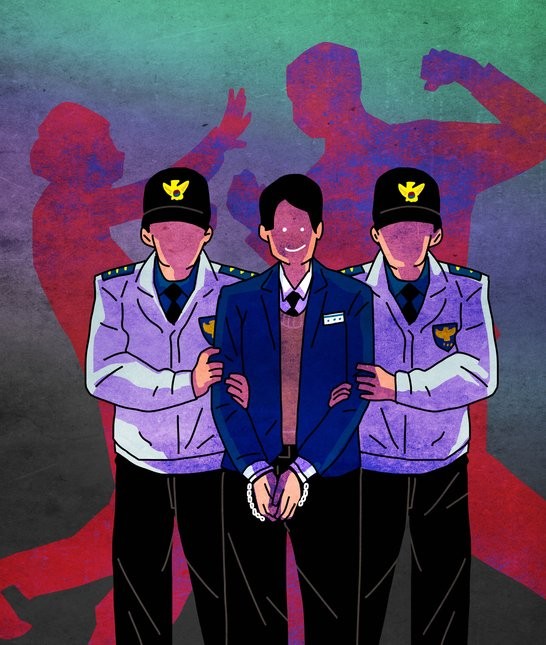The Juvenile Law was enacted to promote the sound growth of teenagers by providing protective measures for the adjustment to their environment and the correction of their deviant behavior. Juvenile delinquents are divided into ‘young offenders’ under 10 years old, ‘criminal minors’ between the ages of 10 and 14, and ‘juvenile offenders’ between the ages of 14 and 19. Although juvenile offenders are subject to criminal penalties, they are sentenced using a milder standard for special cases under the juvenile law. The cases in which criminal minors are commuted to the juvenile law have sparked a controversy about whether it is justifiable to strengthen punishment. However, I strongly assert that the age of juvenile law be lowered to include criminal minors for the following three reasons.
 |
| ▲ Juvenile crimes are becoming more cruel these days. (Photo from Gettyimages) |
First, it is essential to lower the age criterion of juvenile law because the current punishment for juvenile crimes is comparatively weak. Adolescents are subject to juvenile law and therefore usually receive reduced sentences in comparison to adults who commit the same crime. Young offenders and criminal minors are not subject to criminal punishment because the criminal law specifies that ‘the actions of a person who is under 14 years old are not punishable.’ Under the current juvenile law, a young offender who committed felony cannot be sentenced to heavy penalty. Unlike ordinary criminal punishments, no criminal record is left in order to prevent labeling effect. The juvenile law also limits a teenager under 18 years old to serve up to 15 years of limited penal servitude, even if he or she commits a serious crime that is equivalent to death or life imprisonment. Under the “Special Cases on Punishment of Specific Violent Crimes”, juvenile offenders can avoid the death penalty or life imprisonment even if they are sentenced to 20 years in prison. The law attempts to focus on rehabilitation rather than punishment, because they are not mature yet and are more likely to act impulsively. However, it is reasonable to question the policy of putting reformation ahead of punishment for juvenile offenders who commit serious crimes. According to the ‘2019 Youth Statistics’ by the Ministry of Justice, among juvenile crimes committed by teenagers who are under 18 years old, violent crimes such as murder, robbery, arson, and sexual abuse rose 6.7% from 35.7 cases in 2016 to 38.1 in 2017 for every 100,000 juveniles. Furthermore, juvenile violent crime also increased to 11.3% or 207.7 cases to 231.2 cases for every 100,000 teenagers during the same period. These figures indicate the need to look for stronger countermeasures against juvenile delinquency. I think that lowering the age of those who qualify for juvenile law and strengthening the punishment will have a significant impact on lowering the juvenile crime rate.
Secondly, the laws governing juveniles must be revised if they run counter to their original purpose of enactment, which was to educate antisocial teenagers and prevent juvenile delinquency. Contrary to the original intent of juvenile law, some young offenders abuse their status as teenagers, committing brutal and daring crimes. For example, the 2017 assault case by a group of middle school students in Busan triggered discussion about revising the juvenile law. This incident was spread as the perpetrators sent a photo of the victim, kneeling down and covered in blood, to their acquaintances through social media. It provoked public indignation when one of the assailants turned out to be under 14 years old and therefore was not subject to a criminal penalty. According to a public opinion poll on the juvenile law conducted by Realmeter in 2019, 62.6% of the respondents agreed that ‘Some provisions of the juvenile law should be revised to strengthen the punishment’. This means that more people are calling for a stronger action on juvenile delinquency. Every time a serious juvenile crime occurs, a national petition ensues urging the abolishment or revision of the juvenile law. In response, the national assembly of Korea has proposed 6 revisions of the juvenile act, all focusing on reducing the age of juvenile offenders from 14 to 12 years old. I agree with the proposed revisions. With the rapidly changing stream of the times, teenagers are growing not only mentally, but also physically faster, and the time has come when they cannot be merely dismissed as the actions of a child.
Finally, I think it is crucial to raise the awareness of teenagers about crime and prevent juvenile crime by lowering the age of juvenile law. Since teenagers are fully capable of determining right from wrong, they should not be excused from their crimes just because they’re young. It may be important to help juvenile offenders reflect on their action, educate them and let them return to society giving them a second chance, but it is also important for a society to maintain the rule of law and punish those who willingly take part in heinous crimes. They need to understand that with every decision comes great responsibility. Neglecting juvenile crime without taking proper action is a complete breach of our responsibility to protect the rights of victim.
The current juvenile law puts emphasis on educating antisocial teenagers for their healthy development rather than aiming at punishment itself. Controversy surrounding our juvenile law is based on the perception that the number of juvenile delinquents is increasing, and their crimes are becoming increasingly more brutal. Taking into consideration the juvenile crime cases we have seen over the last few years, I question whether the current juvenile law is actually effective in preventing serious juvenile crime. Therefore, it is necessary to lower the age of juvenile law in order to strengthen the punishment of these offenders and educate them to be responsible for their own actions, making sure the law serves its intended purpose.
남윤경 dankookherald@gmail.com

 Vote for the Campus Brand Naming!
Vote for the Campus Brand Naming!

![[Campus Magnifier] Let's Surf the Library!](/news/thumbnail/202404/12496_1765_4143_v150.jpg)




